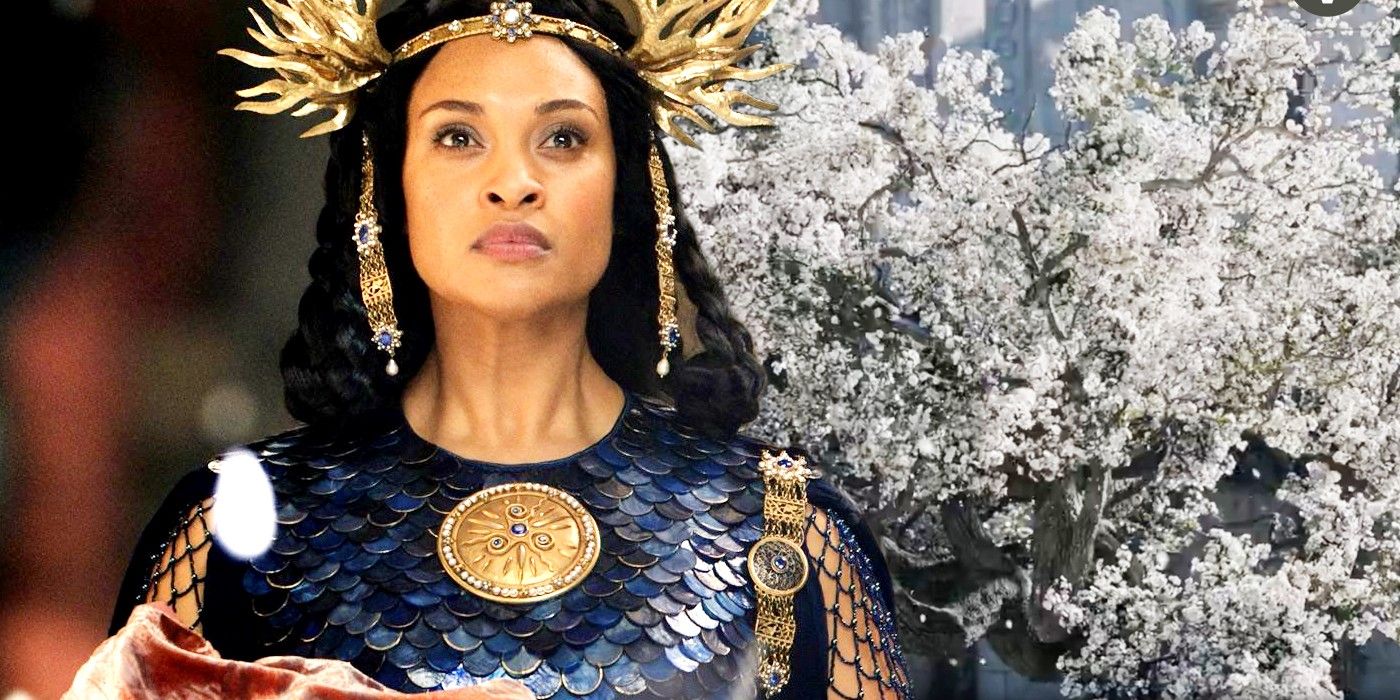Warning: spoilers ahead for The Rings of Power episode 4The leaves of Númenor's white tree falling is not a good sign in The Lord of the Rings: The Rings of Power episode 4 - here's why Queen Regent Míriel and Elendil are so scared by such a wondrous natural sight. Morfydd Clark's Galadriel had no intention of requesting military aid from the Númenóreans, but after she was escorted to the mythical island kingdom anyway, she decided nothing could be lost by trying. Queen Regent Míriel resolutely denied Galadriel's request, citing her island's unfavorable opinion of the elves as the main reason Númenor cannot get involved in the fight against Sauron.
Míriel's mind is swayed when Galadriel finally leaves the island. The Queen Regent turns her back on the departing boat and heads for home, but notices Númenor's white tree, Nimloth, has begun shedding its white leaves. As the blossom-like petals swirl around Númenor's port, Míriel takes the decision to welcome Galadriel back and accept her request after all. Particularly fascinating is how frightened Míriel and Elendil appear when those petals begin falling in The Rings of Power episode 4. Their expressions aren't thankful, blessed or glad - they're utterly terrified. And there's a good reason for that.
The Rings of Power episode 3 saw Míriel remind Elendil (who must've been wondering why his Queen suddenly started talking in exposition) that the Faithful - those who remain loyal to the Valar and the old ways - believe that when Nimloth's petals fall, the Valar themselves are crying. That this divine event should happen at the exact moment the Númenóreans wave Galadriel off after rejecting her plea for help sends a very clear message that Valinor is unhappy. What makes this message especially scary for Míriel is the vision of Númenor's destruction she witnessed in the island's palantír. Thanks to this troubling knowledge, Míriel knows the petals are a first sign that disaster is nearing, so making the Valar cry by sending Galadriel back to Middle-earth alone is essentially bringing Númenor one step closer to doom. The reason Elendil looks equally frightened can be explained by J.R.R. Tolkien's original mythology. Elendil's father, Amandil, foresaw that his island's blasphemy would one day invite the Valar's ire, and he shared these beliefs with his son. Nimloth's falling petals perhaps prove to Elendil that his old man was right.
How The Rings Of Power Adapts Tolkien's Nimloth Prophecy
Nimloth's falling petals in The Rings of Power episode 4 take inspiration from a similar Númenor prophecy in Tolkien's original mythology. The tree itself is of great importance, descended from Valinor's Galathilion, which was made by the Vala Yavanna in the image of Telperion, one of the two great trees from The Rings of Power's opening history lesson. Such divine heritage explains why Queen Regent Míriel would believe Nimloth is representative of the Valar's judgment.
In Tolkien's legendarium, Nimloth was abandoned and left to wilt as Númenor's rulers grew increasingly incensed by the Valar's superiority. A wiser king - Tar-Palantir, Míriel's father - then came along and restored the island's old values, nursing Nimloth back to its former glory. Tar-Palantir lived up to his name by predicting that if Nimloth should ever die completely, Númenor's long line of kings would die along with it. Whether this prophecy still stands in The Rings of Power or has been replaced by the falling petals is unclear, but if Tar-Palantir made the same forecast as he did in Tolkien's source material, Míriel, Elendil and any other Númenóreans who know their history are right to be frightened by the prospect of their beloved tree being anything less than perfectly healthy.
Join Amazon Prime - Watch Thousands of Movies & TV Shows Anytime
The Lord of the Rings: The Rings of Power continues Thursday/Friday on Prime Video.


